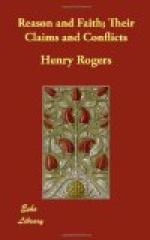after all, to lay itself down again with a very puzzled
expression—and acknowledge that of its very
self, itself knows little or nothing! ‘I
am material,’ exclaims one of those whimsical
beings, to whom the heaven-descended ‘Know thyself’
would seem to have been ironically addressed.
‘No!—immaterial,’ says another.
’I am both material and immaterial,’ exclaims,
perhaps, the very same mind at different times.
‘Thought itself may be matter modified,’
says one. ‘Rather,’ says another
of the same perplexed species, ’matter is thought
modified; for what you call matter is but a phenomenon.’
But are independent and totally distinct substances,
mysteriously, inexplicably conjoined,’ says
a third. ’How they are conjoined we know
no more than the dead. Not so much, perhaps.’
‘Do I ever cease to think,’ says the mind
to itself, ‘even in sleep? Is not my essence
thought?’ ’You ought to know your own
essence best,’ all creation will reply.
’I am confident,’ says one, ’that
I never do cease to think,—not even in the
soundest sleep.’ ‘You do, for a long
time, every night of your life,’ exclaims another,
equally confident and equally ignorant. ’Where
do I exist?’ it goes on. ’Am I in
the brain? Am I in the whole body? ’Am
I anywhere? Am I nowhere?’ ’I cannot
have any local existence, for I know I am immaterial,’
says one. ’I have a local existence, because
I am material,’ says another. ’I
have a local existence, though I am not material,’
says a third. ‘Are my habitual actions voluntary,’
it exclaims, ’however rapid they become; though
I am unconscious of these volitions when they have
attained a certain rapidity; or do I become a mere
automaton as respects such actions? and therefore an
automaton nine times out of ten, when I act at all?’
To this query two opposite answers are given by different
minds; and by others, perhaps wiser, none at all;
while, often, opposite answers are given by the same
mind at different times. In like manner has every
action, every operation, every emotion of the mind
been made the subject of endless doubt and disputation.
Surely if, as Soame Jenyns imagined, the infirmities
of man, and even graver evils, were permitted in order
to afford amusement to superior intelligences, and
make the angels laugh, few things could afford them
better sport than the perplexities of this child of
clay engaged in the study of himself. ‘Alas,’
exclaims at last the baffled spirit of this babe in
intellect, as he surveys his shattered toys—his
broken theories of metaphysics, ’I know that
I am; but what I am—where I am—even
how I act—not only what is my essence,
but what even my mode of operation,—of
all this I know nothing; and, boast of reason as I
may, all that I think on these points is matter of
opinion—or is matter of faith!’ He
resembles, in fact, nothing so much as a kitten first
introduced to its own image in a mirror: she runs
to the back of it, she leaps over it, she turns and
twists, and jumps and frisks, in all directions, in
the vain attempt to reach the fair illusion; and, at
length, turns away in weariness from that incomprehensible
enigma—the image of herself.




